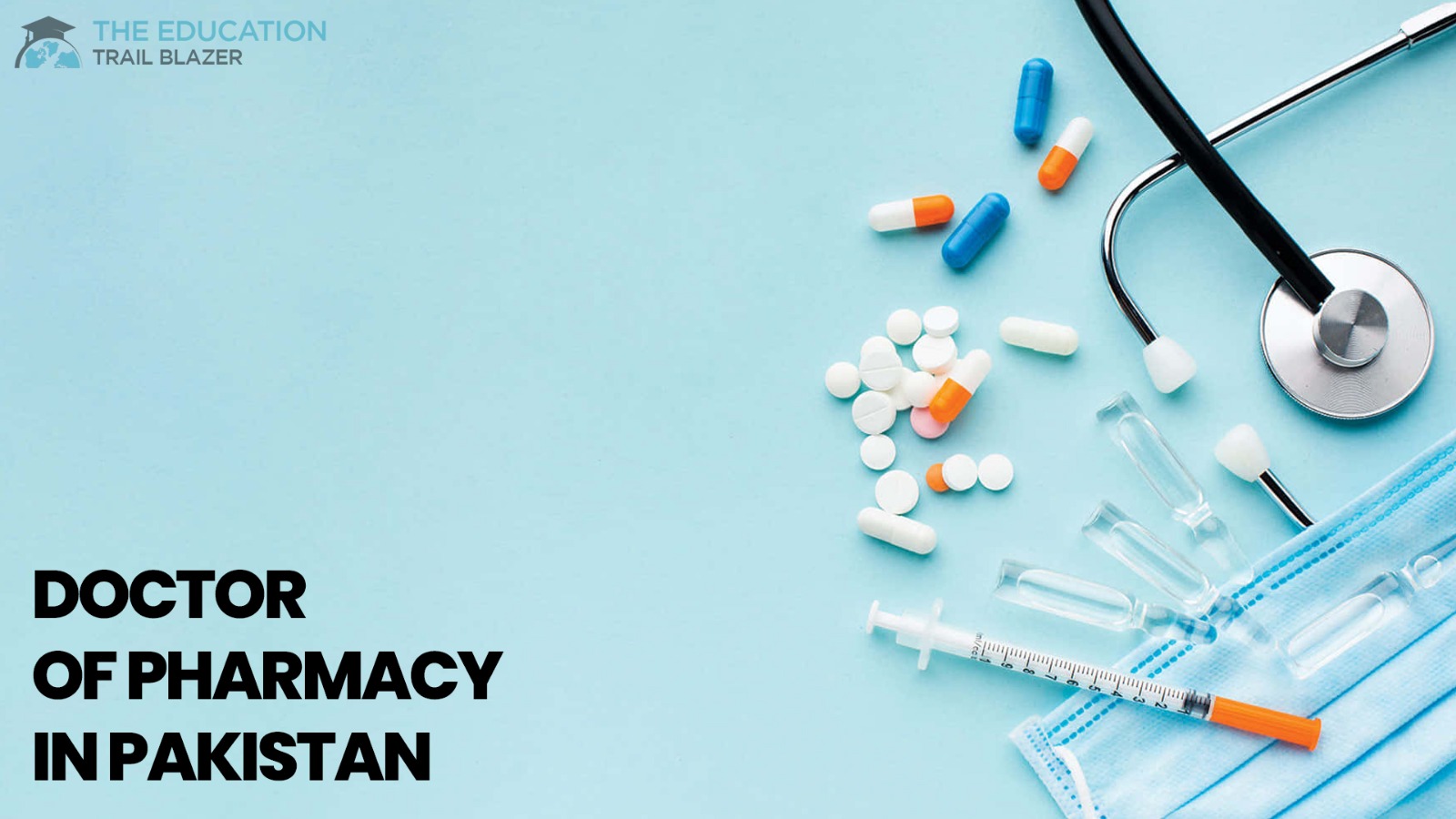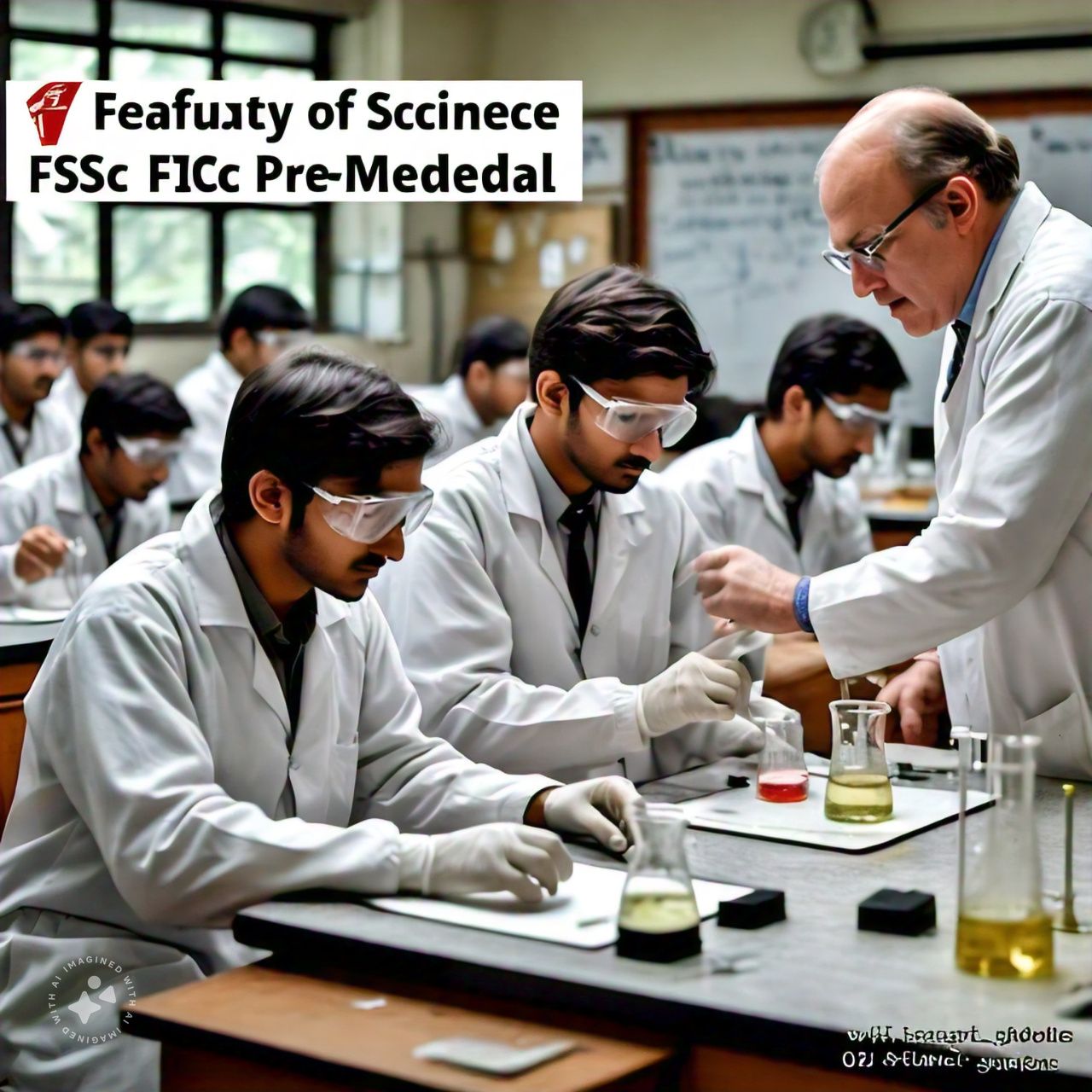Pharmacy is the science and practice of preparing, dispensing, and reviewing drugs and providing additional clinical services. It is a health profession that links health sciences with pharmaceutical sciences and aims to ensure the safe, effective, and affordable use of drugs. Pharmacy is an essential part of the healthcare system and plays a vital role in improving public health and patient outcomes.
In Pakistan, pharmacy education has evolved over the years to meet the changing needs and demands of the profession and society. The Doctor of Pharmacy (Pharm.D) is a five-year degree program that prepares graduates to become competent and ethical pharmacists who can provide pharmaceutical care in various settings. In this article, we will explore the following aspects of Pharm.D education in Pakistan:
- Pharm.D curriculum in Pakistan
- Admission requirements for Pharm.D programs
- Accreditation and recognized institutions
- Licensing and certification for pharmacists
- Challenges and future trends in pharmacy education
- Role of Pharm.D graduates in healthcare
Pharm.D Curriculum in Pakistan
The Pharm.D curriculum in Pakistan is designed to provide students with comprehensive knowledge and skills in pharmaceutical sciences, clinical pharmacy, pharmacy practice, and research. The curriculum is regulated by the Pharmacy Council of Pakistan (PCP), which is the statutory body responsible for maintaining the standards of pharmacy education and practice in the country.
The duration and structure of the Pharm.D program are as follows:
- The program consists of 10 semesters spread over five years.
- Each semester comprises 16 to 18 weeks of teaching and learning activities, followed by examinations.
- The program requires the completion of 200 credit hours, including 77% discipline-specific courses and 23% compulsory and general courses.
- The program also requires a minimum of six months of clinical training or internship in a hospital or community pharmacy setting.
- The program culminates with a research project or thesis, which is mandatory for graduation.
The prerequisite education for admission to the Pharm.D program is as follows:
- The candidate must have passed the Higher Secondary School Certificate (HSSC) examination or equivalent with at least 60% marks in pre-medical subjects (Biology, Chemistry, Physics).
- The candidate must have qualified the entry test conducted by the respective university or institution, or the provincial or national testing agency.
- The candidate must have appeared for an interview conducted by the respective university or institution.
The core coursework of the Pharm.D program covers the following areas:
Pharmaceutical Chemistry: This area deals with the synthesis, analysis, identification, and quality control of drugs and drug products. It also covers the principles of medicinal chemistry, organic chemistry, biochemistry, biotechnology, and pharmacognosy.
Pharmaceutics: This area deals with the design, formulation, manufacturing, testing, and evaluation of dosage forms and drug delivery systems. It also covers the principles of physical pharmacy, biopharmaceutics, pharmacokinetics, industrial pharmacy, pharmaceutical technology, quality assurance, and regulatory affairs.
Pharmacology: This area deals with the study of drug action on living systems. It covers the principles of pharmacodynamics, pharmacotherapeutics, toxicology, clinical pharmacology, pharmacogenetics, pharmacovigilance, and drug interactions.
Pharmacy Practice: This area deals with the application of pharmaceutical knowledge and skills to provide patient-centered care. It covers the principles of dispensing, community pharmacy, hospital pharmacy, clinical pharmacy, pharmaceutical care, pharmaceutical ethics, pharmaceutical management, and pharmaceutical marketing.
The clinical training or internship provides students with hands-on experience in various aspects of pharmacy practice under the supervision of qualified pharmacists. The internship may be conducted in one or more settings such as:
Hospital Pharmacy: This setting involves providing pharmaceutical services to hospitalized patients and healthcare professionals. It includes activities such as drug procurement, storage, distribution, dispensing, administration, monitoring, and counseling.
Community Pharmacy: This setting involves providing pharmaceutical services to ambulatory patients and the general public. It includes activities such as prescription filling, over-the-counter medication selling, patient education, health promotion, and disease prevention.
Industrial Pharmacy: This setting involves working in a pharmaceutical industry or organization involved in drug development, manufacturing, quality control, research, or marketing. It includes activities such as product formulation, testing, evaluation, packaging, labeling, and promotion.
The elective courses allow students to choose from a variety of topics related to their interests and career goals. Some examples of elective courses are:
Pharmaceutical Biotechnology: This course covers the application of biotechnology to drug discovery, development, and production. It includes topics such as recombinant DNA technology, genetic engineering, gene therapy, vaccines, antibodies, and biosimilars.
Pharmacoeconomics: This course covers the economic aspects of drug use and healthcare. It includes topics such as cost-benefit analysis, cost-effectiveness analysis, cost-minimization analysis, cost-utility analysis, budget impact analysis, and health technology assessment.
Admission Requirements for Pharm.D Programs
The admission requirements for Pharm.D programs vary from institution to institution, but generally include the following:
Academic Eligibility: The candidate must have passed the HSSC examination or equivalent with at least 60% marks in pre-medical subjects (Biology, Chemistry, Physics). Some institutions may have higher or lower cut-off marks depending on the number and quality of applicants.
Entry Tests and Interviews: The candidate must have qualified the entry test conducted by the respective university or institution, or the provincial or national testing agency. The entry test may consist of multiple-choice questions based on the HSSC syllabus, general knowledge, aptitude, and English language. Some institutions may also conduct interviews to assess the candidate’s communication skills, personality, and motivation.
Application Process: The candidate must apply for admission to the desired university or institution through online or offline mode. The candidate must submit the required documents such as academic transcripts, certificates, entry test result, domicile certificate, national identity card, etc. The candidate must also pay the application fee as prescribed by the respective university or institution.
Fee Structure: The fee structure for Pharm.D programs varies from institution to institution, depending on the type, location, and reputation of the institution. Generally, public sector institutions charge lower fees than private sector institutions. The fee structure may also depend on the category of admission, such as merit-based, self-financed, foreign quota, etc. The fee structure may include tuition fee, admission fee, registration fee, examination fee, library fee, laboratory fee, hostel fee, etc.
Accreditation and Recognized Institutions
The accreditation and recognition of Pharm.D programs are done by the following bodies:
Pharmacy Council of Pakistan (PCP): PCP is the statutory body responsible for regulating the pharmacy education and practice in Pakistan. PCP grants accreditation to Pharm.D programs based on certain criteria such as curriculum, faculty, infrastructure, facilities, etc. PCP also conducts inspections and evaluations of Pharm.D institutions to ensure quality standards and compliance. PCP issues licenses to Pharm.D graduates to practice as pharmacists in Pakistan.
Higher Education Commission (HEC): HEC is the apex body responsible for overseeing the higher education sector in Pakistan. HEC grants recognition to Pharm.D programs based on certain criteria such as affiliation, accreditation, faculty, research, etc. HEC also conducts ranking and rating of Pharm.D institutions to measure their performance and quality. HEC issues equivalence certificates to Pharm.D graduates to facilitate their academic and professional mobility.
The list of accredited and recognized Pharm.D institutions in Pakistan can be obtained from the websites of PCP and HEC. According to PCP, there are 386 Pharm.D institutions in Pakistan as of 2020, out of which 14 are public sector institutions and 23 are private sector institutions. According to HEC, there are 136 Pharm.D institutions in Pakistan as of 2018.
Some of the top Pharm.D institutions in Pakistan are:
- University College of Pharmacy, University of the Punjab, Lahore
- Faculty of Pharmacy, University of Karachi, Karachi
- Faculty of Pharmacy and Alternative Medicine, Islamia University of Bahawalpur
- Faculty of Pharmacy and Health Sciences, University of Balochistan
- Faculty of Pharmacy and Pharmaceutical Sciences, University of Peshawar
- Faculty of Pharmacy and Alternative Medicine (FOPAM), Riphah International University
- Faculty of Pharmacy (FOP), Hamdard University
- Faculty Of Pharmacy (FOP), Ziauddin University
- Faculty Of Pharmacy (FOP), Baqai Medical University
- Faculty Of Pharmacy (FOP), Jinnah Sindh Medical University
The rankings and reputation of Pharm.D institutions in Pakistan can be obtained from various sources such as the HEC ranking system, QS World University Rankings by Subject, Times Higher Education World University Rankings by Subject, etc.
Licensing and Certification for Pharmacists
The licensing and certification for pharmacists in Pakistan are done by the following body:
Pakistan Pharmacy Council (PPC)
PC is the statutory body responsible for regulating pharmacy education and practice in Pakistan. PPC grants licenses to Pharm.D graduates to practice as pharmacists in Pakistan. PPC also conducts examinations and assessments for pharmacists to ensure their competence and professionalism.
To obtain a license from PPC, a Pharm.D graduate must fulfill the following requirements:
- Complete a six-month internship in a hospital.
- Pass the National Pharmacy Licensing Examination (NPLE) conducted by PPC. The NPLE consists of two parts: Part I (Theory) and Part II (Practical). The Part I covers topics such as pharmaceutical chemistry, pharmaceutics, pharmacology, pharmacy practice, etc. The Part II covers topics such as prescription handling, drug identification, compounding, dispensing, etc.
- Apply for the license from PPC by submitting the required documents such as academic transcripts, internship certificate, NPLE result, identity card, etc. The license fee is Rs 5000 for the first time and Rs 1000 for renewal every five years.
The license from PPC allows a pharmacist to practice in any setting or sector in Pakistan, such as hospital pharmacy, community pharmacy, industrial pharmacy, academia, research, etc. However, some settings or sectors may require additional certification or registration from other authorities or organizations.
Challenges and Future Trends in Pharmacy Education
Pharmacy education in Pakistan faces several challenges and opportunities in the present and future scenarios. Some of these are:
Challenges Facing Pharm.D Education
Lack of Uniformity and Quality: The Pharm.D curriculum in Pakistan lacks uniformity and quality across different institutions. There is no standardization or harmonization of the curriculum content, delivery, assessment, and evaluation. Some institutions follow outdated or irrelevant curricula that do not meet the current and future needs and demands of the profession and society. Some institutions lack qualified faculty, adequate infrastructure, modern facilities, and industry linkages that affect the quality of education and training.
Lack of Recognition and Respect: The Pharm.D degree in Pakistan lacks recognition and respect from other healthcare professionals and stakeholders. There is a misconception that Pharm.D graduates are not real doctors or equivalent to MBBS graduates. There is also a lack of awareness and appreciation of the role and scope of pharmacists in healthcare. This leads to low self-esteem, motivation, and satisfaction among Pharm.D graduates and affects their career prospects and opportunities.
Lack of Research and Innovation: The Pharm.D education in Pakistan lacks research and innovation culture and environment. There is a limited number of research projects or publications conducted or produced by Pharm.D students or faculty. There is also a lack of funding, resources, facilities, and incentives for research and innovation activities. This hampers the advancement of pharmaceutical knowledge and practice in Pakistan.
Advancements in Pharmaceutical Sciences
Pharmaceutical sciences are constantly evolving and advancing with new discoveries and developments in various fields such as:
Drug Discovery and Development: This field involves the identification, synthesis, and optimization of new chemical entities or natural products that have potential therapeutic effects. It also involves the preclinical and clinical testing, evaluation, and approval of new drugs for human use. It employs techniques such as molecular modeling, combinatorial chemistry, high-throughput screening, genomics, proteomics, metabolomics, etc.
Drug Delivery Systems: This field involves the design, formulation, manufacturing, and evaluation of novel systems that can deliver drugs to specific sites or targets in the body with enhanced efficacy, safety, and convenience. It employs techniques such as nanotechnology, biomaterials, microencapsulation, controlled release, targeted delivery, etc.
Pharmacogenomics: This field involves the study of how genetic variations affect drug response and drug efficacy, safety, and dosage. It also involves the development of personalized medicine and pharmacotherapy based on individual genetic profiles. It employs techniques such as DNA sequencing, genotyping, gene expression analysis, etc.
Pharmacometrics: This field involves the application of mathematical and statistical methods to quantify drug, disease, and trial information. It also involves the integration and interpretation of data from various sources such as preclinical, clinical, and epidemiological studies. It employs techniques such as pharmacokinetic modeling, pharmacodynamic modeling, population pharmacokinetic/pharmacodynamic modeling, etc.
These advancements in pharmaceutical sciences create new opportunities and challenges for Pharm.D education and practice in Pakistan. They require Pharm.D graduates to update and upgrade their knowledge and skills to keep pace with the latest developments and innovations in the field. They also require Pharm.D graduates to adopt a multidisciplinary and collaborative approach to solve complex problems and issues in pharmaceutical sciences.
Technological Innovations
Technological innovations are transforming pharmacy education and practice in Pakistan with new tools and platforms that enhance the efficiency, effectiveness, and accessibility of pharmaceutical services. Some examples of technological innovations are:
E-Learning: E-learning is the use of electronic media and devices to deliver educational content and activities. It enables Pharm.D students and faculty to access online courses, lectures, tutorials, quizzes, assignments, etc. from anywhere and anytime. It also enables Pharm.D students and faculty to interact with each other and with experts from around the world through online forums, chats, video conferences, etc.
E-Pharmacy: E-pharmacy is the use of Internet and mobile applications to provide online pharmacy services such as ordering, purchasing, delivering, and consulting of drugs and drug products. It offers convenience, affordability, and privacy to customers and pharmacists alike. It also offers opportunities for Pharm.D graduates to work as online pharmacists or consultants.
E-Health: E-health is the use of information and communication technologies to improve health outcomes and healthcare delivery. It includes aspects such as telemedicine, telepharmacy, electronic health records, clinical decision support systems, health information systems, etc. It enables Pharm.D graduates to provide pharmaceutical care to remote or underserved populations through telepharmacy or telemedicine platforms. It also enables Pharm.D graduates to access and share health information and data with other healthcare professionals through electronic health records or health information systems.
These technological innovations create new opportunities and challenges for Pharm.D education and practice in Pakistan. They require Pharm.D graduates to acquire digital literacy and competency to use various technologies effectively and ethically. They also require Pharm.D graduates to adapt to the changing needs and expectations of customers and stakeholders in the digital era.
Global Trends and Adaptations
Global trends are influencing the pharmacy education and practice in Pakistan with new developments and standards that affect the quality and relevance of pharmaceutical services. Some examples of global trends are:
Internationalization: Internationalization is the process of increasing the involvement and interaction of Pharm.D students, faculty, and institutions with other countries or regions. It includes aspects such as student exchange, faculty exchange, joint research, collaborative projects, etc. It aims to enhance the quality, diversity, and competitiveness of Pharm.D education and practice in Pakistan. It also aims to promote cross-cultural understanding, global citizenship, and international cooperation among Pharm.D students, faculty, and institutions.
Accreditation: Accreditation is the process of evaluating and recognizing the quality and standards of Pharm.D programs and institutions by external agencies or organizations. It includes aspects such as curriculum, faculty, infrastructure, facilities, outcomes, etc. It aims to ensure the quality, relevance, and credibility of Pharm.D education and practice in Pakistan. It also aims to facilitate the academic and professional mobility of Pharm.D graduates within and outside the country.
Innovation: Innovation is the process of creating and implementing new ideas or solutions that address the problems or needs of the pharmacy profession and society. It includes aspects such as research, development, commercialization, etc. It aims to advance the knowledge, skills, and practice of Pharm.D graduates in Pakistan. It also aims to contribute to the economic, social, and environmental development of the country.
These global trends create new opportunities and challenges for Pharm.D education and practice in Pakistan. They require Pharm.D graduates to develop global competencies and perspectives that enable them to compete and collaborate with other countries or regions. They also require Pharm.D graduates to adopt a culture of innovation that enables them to create and implement new ideas or solutions that address the problems or needs of the pharmacy profession and society.
Role of Pharm.D Graduates in Healthcare
Pharm.D graduates play a crucial role in healthcare by providing pharmaceutical care in various settings or sectors. Pharmaceutical care is defined as “the responsible provision of drug therapy for the purpose of achieving definite outcomes that improve a patient’s quality of life”. Pharmaceutical care involves three major functions:
- Identifying potential or actual drug-related problems
- Resolving actual drug-related problems
- Preventing potential drug-related problems
Pharm.D graduates perform these functions by applying their knowledge and skills in pharmaceutical sciences, clinical pharmacy, pharmacy practice, and research. Pharm.D graduates also perform these functions by collaborating with other healthcare professionals and stakeholders. Some examples of the role of Pharm.D graduates in healthcare are:
Patient-Centric Care
Patient-centric care is the approach of providing care that is respectful of and responsive to individual patient preferences, needs, and values. Pharm.D graduates provide patient-centric care by:
- Assessing the patient’s medical history, drug history, allergies, etc.
- Educating the patient about the drug therapy, including the indication, dosage, administration, side effects, interactions, etc.
- Monitoring the patient’s response to the drug therapy, including the efficacy, safety, adherence, etc.
- Counseling the patient on lifestyle modifications, disease prevention, self-care, etc.
- Empowering the patient to make informed decisions about their health and well-being.
Interdisciplinary Collaboration
Interdisciplinary collaboration is the process of working together with other healthcare professionals and stakeholders to achieve common goals and outcomes. Pharm.D graduates collaborate with other healthcare professionals and stakeholders by:
- Communicating effectively and respectfully with other healthcare professionals and stakeholders
- Participating in multidisciplinary team meetings, rounds, consultations, etc.
- Providing drug information and recommendations to other healthcare professionals and stakeholders
- Reporting and resolving drug-related problems or issues with other healthcare professionals and stakeholders
- Coordinating and integrating pharmaceutical services with other healthcare services
Public Health Initiatives
Public health initiatives are the actions or programs that aim to improve the health and well-being of the population or community. Pharm.D graduates participate in public health initiatives by:
- Conducting health education and promotion campaigns on topics such as drug abuse prevention, immunization awareness, chronic disease management, etc.
- Providing health screening and testing services for diseases such as diabetes, hypertension, hepatitis, HIV/AIDS, etc.
- Providing immunization and vaccination services for diseases such as influenza, polio, measles, etc.
- Providing emergency and disaster relief services for situations such as floods, earthquakes, epidemics, etc.
Impact on Healthcare Delivery
Healthcare delivery is the process of providing healthcare services to patients or populations. Pharm.D graduates impact healthcare delivery by:
- Improving the quality and safety of healthcare services by ensuring the appropriate use of drugs and drug products
- Reducing the cost and waste of healthcare services by optimizing drug therapy and minimizing the drug-related problems
- Enhancing the access and equity of healthcare services by providing pharmaceutical services to underserved or remote populations
- Advancing the innovation and research of healthcare services by conducting or participating in clinical trials or studies
Conclusion
Pharm.D is a five-year degree program that prepares graduates to become competent and ethical pharmacists who can provide pharmaceutical care in various settings or sectors. Pharm.D education in Pakistan is regulated by PCP and HEC, which ensure the quality and standards of Pharm.D programs and institutions. Pharm.D graduates in Pakistan face several challenges and opportunities in the present and future scenario due to the advancements in pharmaceutical sciences, technological innovations, and global trends. Pharm.D graduates play a crucial role in healthcare by providing patient-centric care, interdisciplinary collaboration, public health initiatives, and impact on healthcare delivery.
Is D Pharm a doctor in Pakistan?
Is D pharmacy equal to MBBS in Pakistan?
What is the salary of a Doctor of Pharmacy in Pakistan?
Related article:





